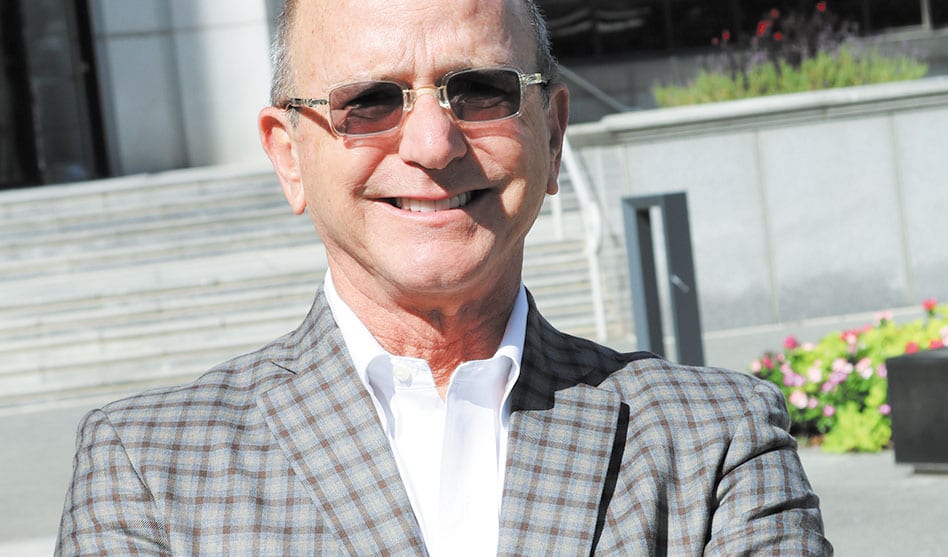Steve Kirkland
If elected, Steve Kirkland would be the first openly LGBT person on the state’s highest civil court
DAVID TAFFET | Senior Staff Writer
taffet@dallasvoice.com
Steve Kirkland said if he wins his race for the Texas Supreme Court, it would be as part of a blue wave. But would a lone Democrat on what’s now an all-Republican court make a difference? He said that if he wins, it is likelythat two other Democrats running for seats on the court will too— and those three judges together would certainly make an impact.
Kirkland was in Dallas recently to attend a Democratic women’s caucus meeting at the Dallas Sheraton Hotel. He drove in from Abilene, where he was the “opening act,” as he called it, for Democratic U.S. Senate candidate Beto O’Rourke. The rally attracted 700 people in one of the reddest cities in the state, Kirkland noted.
Although O’Rourke was the main attraction at that rally, Kirkland said he was responsible for bringing in at least some of the crowd. He grew up in Abilene and still has family and friends there.
While his opponent is well-funded, Kirkland raised $25,000 the week before that rally to add to the Democrats’ coordinated campaign. Money he’s raising above the amount he’s expected to contribute is paying for his travel across the state.
If he’s raised enough by the fall, Kirkland said he’ll do some media.
Kirkland is the first out gay man to run for Texas Supreme Court and was the third openly gay judge in Texas, having been first elected in 2000. (The first was Judge Jerry Birdwell, appointed by then-Gov. Ann Richards to Dallas County’s 195th Judicial District Court in 1992. Houston Municipal Court Judge John Paul Barnich was appointed by Houston Mayor Lee Brown in 1999).
Along with gubernatorial candidate Lupe Valdez, Kirkland is one of first two openly-gay statewide candidates in Texas.
Kirkland currently serves as judge of the 334th Civil Court in Houston. From 2009-2012 he served as judge of the 215th Judicial District Court in Harris County and as a Houston Municipal Court judge from 2000-2008. In addition to his judicial duties, Kirkland teaches communication law and ethics at University of Houston.
He has been with his husband Mark for more than 30 years, and they’ve been married for three years. He credits his husband with his family’s acceptance of his sexual orientation. Noting that his husband is a baker, Kirkland said Mark “baked his way” into his mother’s heart.
Kirkland has lived in Houston since 1978, when he began attending Rice University. He started his legal career as an environmental litigator for Texaco and later became a plaintiff’s attorney, suing Ship Channel Industries for clean air. So, he said, he’s worked on both sides of that issue.
Kirkland is traveling around the state campaigning although, he said, “There’s nothing sexy about coming to hear judges” speak. So most of his stops are in conjunction with local or other statewide Democratic candidates.
He said he has a checklist of issues he touches on when he speaks, mostly criticizing Texas Republicans for their hypocrisy in saying they favor local control but then trying to take that local control away on nearly every issue.
He gave some examples of such decisions by the all-Republican state supreme court:
Laredo had a plastic bag ban in place; the Texas Supreme Court voted to take it away. Then the court limited Houston’s land use ordinance, again taking away local control. In another Houston case, the state supreme court ruled against the right of Houston city employees who have same-sex spouses to receive equal benefits as opposite-sex couples.
Kirkland said the Texas Supreme Court has “completely abrogated” its duty in education cases. While funding education is the job of the Texas Legislature, he said the court has “refused to enforce the Texas Constitution’s mandate to adequately and equitably fund public education. The court ruled funding education is a legislative decision and the courts don’t have a role.”
In a sexual harassment case decided earlier this year, a female Alamo Heights coach was accused of squeezing the breasts and butts of female coworkers and saying, “I’m going to think about you next time I have sex.” The court ruled the plaintiff couldn’t prove the coach who harassed her was gay — she claims to be straight — or that the accused’s actions were led by sexual desire and so dismissed the case.
“That’s why I got pissed enough to run for the Supreme Court,” Kirkland said. “The court keeps making me mad. It impacts the lives of real people in a negative way.”
He said the current court favors “big business,” which is a source of campaign donations for many of the state supreme court justices. Kirkland said his philosophy on courts comes directly from the Texas Constitution: “Every person who has been harmed has a remedy in court.”
Kirkland noted this will be the last year “straight-party voting” will be possible in Texas. The GOP — controlled legislature eliminated it when more and more Democratic voters starting casting straight-party ballots.
The Texas Tribune tracked straight-party voting in the 10 most populous counties in Texas. In 2004, more Republicans than Democrats voted straight-party in six of those 10 counties, including the state’s most populous, Harris County. In 2016, Republicans in only three counties — Tarrant, Denton and Collin — outvoted Democrats with straight-party voting. However, across the state, about 65 percent of voters vote straight party.

